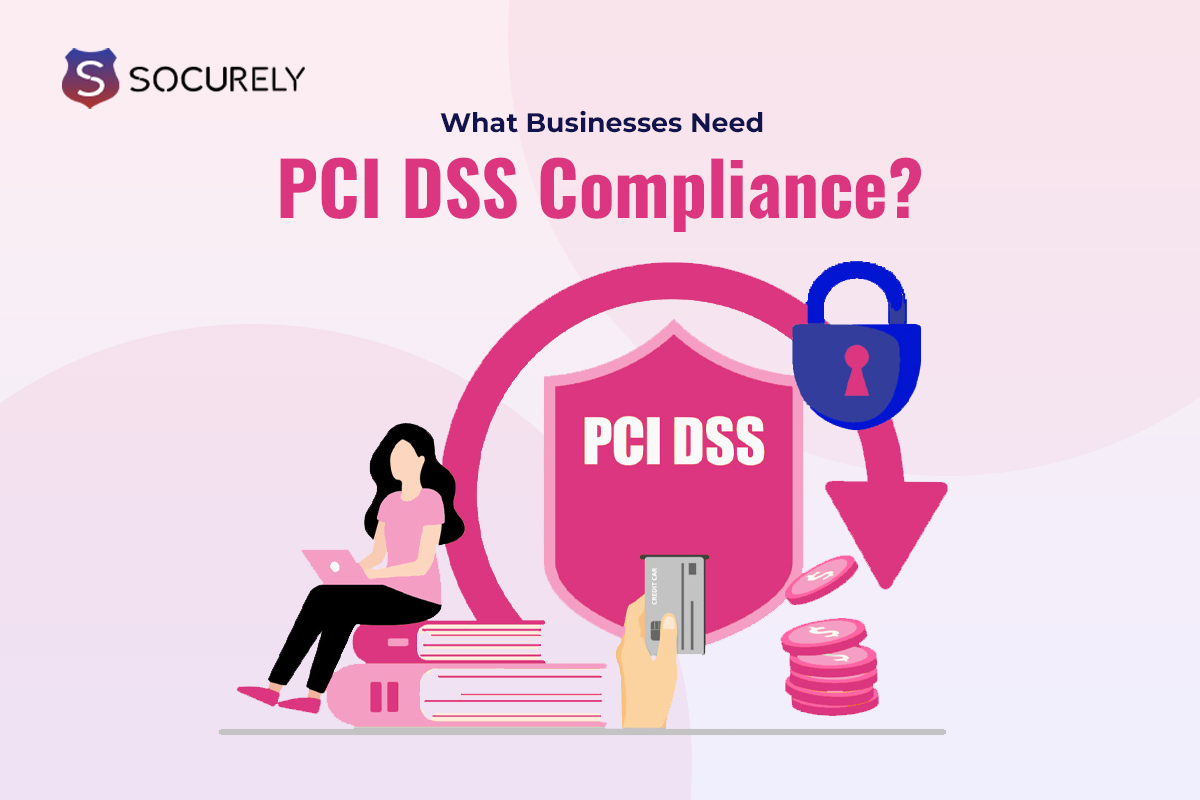With the rise of online shopping and digital payments, ensuring the protection of cardholder data is crucial.
This is where PCI DSS compliance comes into play. PCI DSS compliance is not just a regulatory requirement; it’s a critical measure to safeguard sensitive information and build trust with customers.
Companies who violate PCI DSS risk fines and infractions in addition to fewer repercussions like losing the trust of their clients.
You must ensure whether your company needs PCI DSS compliance.
What Is PCI DSS & Its Purpose?
The PCI Security Standards Council (PCI SSC) developed the Payment Card Industry Data Security Standard (PCI DSS) to safeguard sensitive transaction data against cyberattacks. Major credit card firms, including American Express, MasterCard, Visa, JCB International, and Discover Financial Services, formed the PCI SSC, an independent body, in 2006. Its main responsibility is to oversee the creation and development of the PCI DSS.
Generally, a collection of security guidelines is PCI DSS, designed to guard payment systems against cardholder data (CHD) theft, data breaches, and financial fraud.
On March 31, 2022, the most recent version of PCI DSS 4.0 was released, requiring automated methods to stop phishing. On March 31, 2024, the existing PCI DSS version 3.2.1 will no longer be in effect.
There are common vulnerabilities present in the following domains within the ecosystem of card processing:
- POS (point-of-sale) systems
- Wireless hotspots
- Individual PCs (Personal Computers)
- Unsecured Card data transmitted to service providers
- Paper-based filing
The highest level of security for credit card transactions is guaranteed by PCI DSS. The PCI DSS framework includes 12 comprehensive requirements, ranging from maintaining a secure network to implementing strong access control measures. These standards help businesses enhance their overall cybersecurity posture.
PCI DSS- Who Does It Apply To?
Any company that receives, manages, retains, or transmits cardholder data is subject to PCI DSS. Any company that might influence the security of cardholder data is likewise subject to the standard.
Businesses are divided into two primary groups under the PCI DSS standard: merchants and service providers. The contrasts between the two are covered below.
The PCI DSS Compliance for Merchants-
Any company that takes credit card payments with a logo from one of the five credit card companies—American Express, Visa, Mastercard, Discover, or JCB—is considered a merchant.
Depending on which of the four PCI DSS Compliance Levels your company is in or the particular requirements from your acquiring bank, there are differences in the stages involved in complying with PCI DSS. The quantity of card transactions your company processes in a given year determines these levels.
The levels of merchant compliance are broken down as follows:
Level 1: Companies that handle More than 6 million credit card transactions a year
Level 2: Companies that handle between one million and six million transactions a year
Level 3: Companies that handle between 20,000 and one million transactions a year
Level 4: Companies that do less than 20,000 transactions each year
The PCI DSS Compliance For Service Providers-
On behalf of a merchant, a service provider directly handles the processing, storing, or transmission of cardholder data.
A service provider is also a business that offers services that influence or regulate cardholder data security.
Typical instances of service suppliers are as follows:
- Processors of payments
- Providers of managed point of sale (POS)
- Processors of transactions
- Gateways for payments
- Companies that host websites
- Independent marketing companies
- Companies that maintain point-of-sale (POS) systems
- Companies that provide managed network firewall services
Depending on how many transactions they execute, store, or send, service providers fall into one of two compliance tiers-
Level 1: Service providers handling over 300,000 credit card transactions per year in terms of processing, storing, or sending
Level 2: Vendors who handle, process, or send less than 300,000 credit card transactions per year
The reporting requirements you will need to demonstrate compliance will depend in part on your service provider level. For instance, to demonstrate compliance, a Level 1 service provider must submit to yearly audits by a QSA, whereas a Level 2 service provider must finish an annual SAQ D.
Some other businesses where PCI DSS Compliance applies-
Payment Processors: Companies that process credit card transactions on behalf of merchants must adhere to PCI DSS requirements.
Financial Institutions: Banks and credit card companies involved in issuing or acquiring credit card transactions need to comply with PCI DSS.
E-commerce Businesses: Online retailers that handle card payments must implement PCI DSS measures to protect customer data.
What Type Of Data PCI DSS Protects?
- Cardholder Data- This includes the full Primary Account Number (PAN), cardholder name, expiration date, and service code. Ensuring the protection of this data is crucial to prevent unauthorized access and fraudulent activities.
- Sensitive Authentication Data- This comprises security-related information used to authenticate cardholders and authorize transactions, such as full magnetic stripe data, CVV2, CVC2, CID, and PIN data. Protecting this data is vital to maintaining the integrity of the payment process.
When will PCI DSS Become A Mandatory Compliance?
With the introduction of version 1.0 on December 15, 2004, PCI DSS became required. But as we’ve already mentioned, it’s a security standard rather than a mandate.
Therefore, “mandatory” here refers to the requirement that cloud-hosted businesses or merchants be PCI DSS compliant to enter into contracts with banks and payment card providers that handle payment processing.
PCI DSS compliance and cardholder information security are evaluated for cloud-hosted businesses such as yours through a self-assessment questionnaire (SAQ) that also includes an Attestation of Compliance (AOC). The AOC certifies that your business complies with PCI DSS.
Key Points To Consider-
PCI DSS- A worldwide cybersecurity standard called PCI DSS applies to any cloud-hosted business that handles, transmits, receives, or saves sensitive authentication data as well as cardholder data. The PCI DSS Compliance levels (Levels 1-4) that organizations are assigned vary based on the annual number of Visa transactions.
Compliance Levels: PCI DSS has different levels of compliance based on the volume of credit card transactions processed annually. Businesses must determine their compliance level to understand the specific requirements they need to meet.
Self-Assessment Questionnaires (SAQs): Smaller merchants can complete SAQs to assess their compliance, while larger organizations may require formal audits by Qualified Security Assessors (QSAs).
Continuous Monitoring: PCI DSS compliance is not a one-time effort. It requires continuous monitoring and regular assessments to ensure ongoing adherence to security standards.
Penalties for Non-Compliance: Failure to comply with PCI DSS can result in hefty fines, increased transaction fees, and potential loss of the ability to process credit card payments.
Get PCI DSS Compliance With Socurely
Achieving PCI DSS compliance can be a complex and time-consuming process, but it’s crucial for safeguarding your business and customer data. At Socurely, we specialize in helping businesses of all sizes navigate the complexities of PCI DSS compliance. Our team of experts provides personalized support, from initial assessment to full compliance, ensuring your organization meets all necessary standards.
By partnering with Socurely, you can focus on your core business activities while we handle the intricacies of PCI DSS compliance. Protect your business, build customer trust, and achieve peace of mind with Socurely’s comprehensive PCI DSS compliance solutions.
FAQ
- Which card data falls under the PCI DSS?
The primary account number (PAN), cardholder name, card expiration date, and security code are among the card data that PCI DSS protects.
- What are the 12 requirements of PCI DSS?
The 12 requirements of PCI DSS include maintaining a secure network, protecting cardholder data, maintaining a vulnerability management program, implementing strong access control measures, regularly monitoring and testing networks, and maintaining an information security policy.
- How often do businesses need to assess PCI DSS compliance?
Businesses need to assess PCI DSS compliance annually, but continuous monitoring and regular assessments are recommended to ensure ongoing adherence to security standards.







